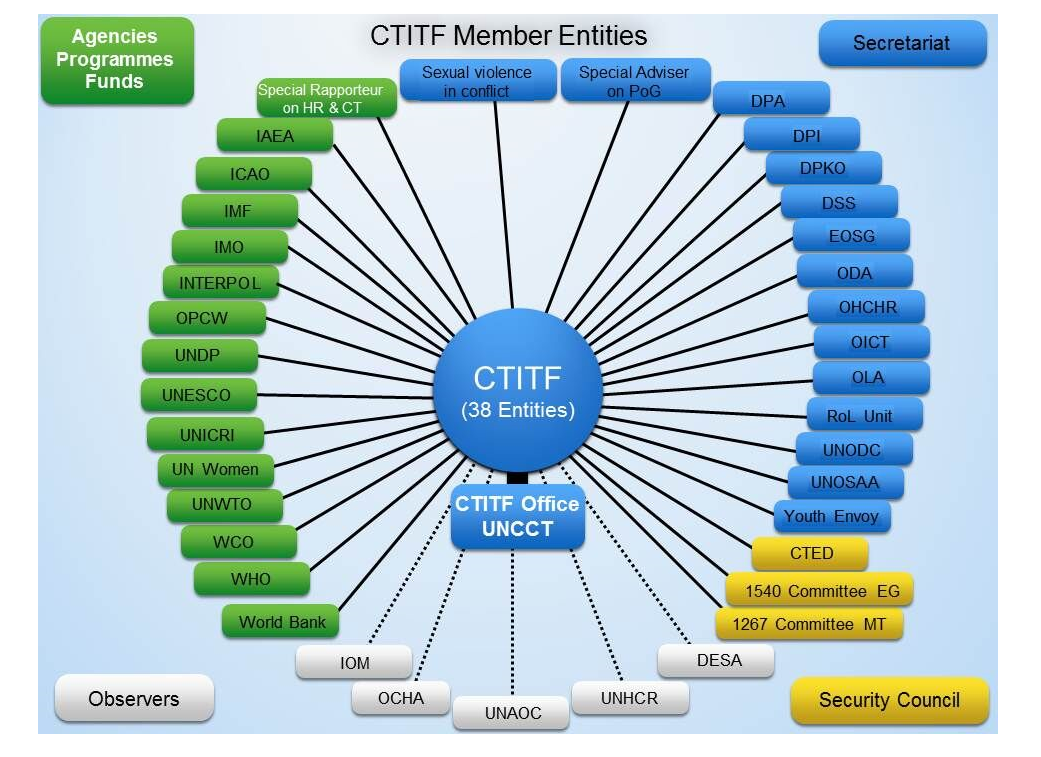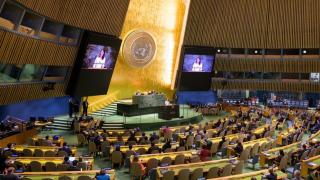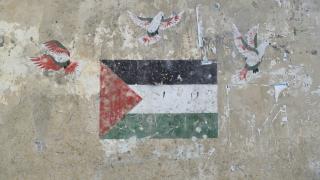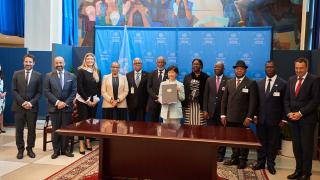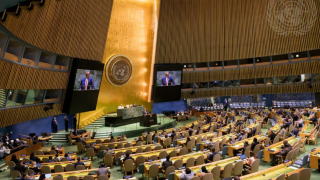Part of our regular series of background briefings on the UN in the news.
Earlier this year, the United Nations established a new office for counter-terrorism to improve the coordination and efficiency of UN counter-terrorism activities, and to increase its assistance to states.
This briefing provides an overview of the UN’s work in this area, and some facts and figures on terrorism around the world.
Terrorism in numbers
- There has been a 550 per cent increase in the number of deaths of private citizens from terrorism since 2000.
- The overwhelming majority of terrorist attacks occur in the developing world. Last year, 12,089 attacks took place, nearly half of which took place in just four countries: Iraq, Afghanistan, Pakistan and India.
- Nearly 30,000 people were killed by terrorists in 2016. Despite the deadly attacks in Europe and North America, they accounted for only 1.8 per cent of terrorism-related deaths.
- The vast majority of deaths – over 70 per cent - occurred in five countries: Iraq, Afghanistan, Nigeria, Syria and Somalia.
- Over 90 per cent of all terrorist attacks occur in countries with high levels of state sponsored terror, involving extrajudicial killing, torture and imprisonment without trial
- Over 90 per cent of all terrorist deaths occur in countries engaged in some form of conflict
What is the UN doing?
The UN General Assembly adopted its first convention on terrorism more than half a century ago (relating to offences committed on aircraft). Some 25 years ago, in the aftermath of the Lockerbie bombing, the Security Council imposed sanctions on Libya for sponsoring terrorist acts. The 9/11 attacks prompted a range of UN measures on terrorism, culminating in the adoption of a Global Counter-Terrorism Strategy in 2006.
The UN’s work covers three main areas:
- Setting norms
This includes the adoption of 19 international legal instruments, covering issues such as nuclear terrorism and financing terrorism; the Global Strategy; and Security Council resolutions that impose binding counter-terrorism obligations on states.
- Assistance to states
This includes assessments and analysis to support states’ counter-terrorism efforts, as well as capacity-building activities to help countries meet their international obligations. The UN Counter-Terrorism Centre, along with other UN bodies such as the UN Office on Drugs and Crime (UNODC) and the Office of the UN High Commissioner on Human Rights (OHCHR), carry out this work in collaboration of UN country teams.
- Sanctions
This includes Security Council-mandated sanctions against state sponsors of terrorism and, since 9/11, against hundreds of individuals and entities affiliated with al-Qaeda and ISIL.
Who is doing this?
Two bodies oversee the UN’s work in this area:
Counter-Terrorism Implementation Task Force
This work involves 38 different UN entities, all of which are members of the Counter-Terrorism Implementation Task Force. They include the Security Council’s Al Qaida/Taliban Monitoring Team, the Counter-terrorism Committee Executive Directorate, the Department of Peacekeeping Operations (DPKO), the International Atomic Energy Agency, the Office of the Secretary-General's Envoy on Youth, the World Tourism Organization and the Special Rapporteur on the promotion and protection of human rights while countering terrorism.
Working closely with two non-UN organisations (the International Criminal Police Organization (INTERPOL) and the World Customs Organization) they do what the UN does best: coordinating actions between various member states, setting down appropriate norms and standards of behaviour, codifying and applying international law, and providing advice and expertise. At the sharp end, Security Council mandated bodies apply sanctions to terrorist individuals and organisations and crack down on money laundering and illicit international cashflows.
The UN Office of Counter Terrorism
In response to a paper written by the Secretary-General, the various sections of the Department for Political Affairs working on this issue were formed into a new office in order to:
- Provide leadership on the UN’s counter-terrorism mandates
- Improve coordination and coherence across the 38 UN bodies
- Ensure the balanced implementation of all four pillars of the global strategy
- Strengthen the delivery of capacity-building assistance to states
- Improve visibility and funding for UN counter-terrorism efforts
- Ensure that due priority is given to counter-terrorism across the UN system
The office is headed by an Under-Secretary General (the third-highest rank in the UN system) – currently Vladimir Voronkov of Russia. He has pledged to take forward the UN’s work in giving voice to victims of terrorism and ensuring they are involved in the development of counter-terrorism strategies.
What is the plan?
Global Counter-Terrorism Strategy
Adopted by consensus at the UN General Assembly in 2006, the strategy marked the first time that states agreed to a common strategic and operational approach to combat terrorism. It has four pillars:
- Addressing conditions conducive to the spread of terrorism
- Preventing and combatting terrorism
- Building Member States’ capacity to prevent and combat terrorism and to strengthen the role of the United Nations system in this regard
- Ensuring the respect for human rights for all and the rule of law as the fundamental basis for countering terrorism
The strategy is reviewed every two years. The last review took place in July 2016, and included consideration of the previous Secretary-General’s Plan of Action to Prevent Violent Extremism.
Earlier this year the new Secretary-General released a report detailing his own thoughts on the issue, the primary consequence of which was the creation of the Office of Counter Terrorism.
How do we protect human rights while countering terrorism?
This has emerged as a key aspect of the UN’s work in this field, involving special rapporteurs – unpaid, independent experts – as well as UN human rights staff.
Successive Special Rapporteurs on protecting rights while countering terrorism have warned about human rights violations by states attempting to combat terrorism, and the counterproductive effect this has. The Special Rapporteur on contemporary forms of racism has also warned that counter-terrorism measures are exacerbating racism and xenophobia.
In many places around the world – including the UK, US and France – counter-terrorism measures have been criticised as infringing on fundamental rights, such as freedom of expression and the right to peaceful assembly. In some countries – Sri Lanka, Syria, Myanmar – attempts to counter terrorism have provided a cover for states to commit appalling atrocity crimes, as they seek to on the one hand blur the line between civilian and terrorist, and on the other make the case that atrocities committed against terrorists are justified.
What is UNA-UK’s view?
As the Global Terrorism Index report highlighted, “93 per cent of all terrorist attacks between 1989 and 2014 occurred in countries with high levels of state sponsored terror, involving extrajudicial killing, torture and imprisonment without trial.” Far from being the enemy of counter terrorism, promotion of global human rights standards and norms is the most powerful and effective tool at our disposal for preventing terrorism.
In addition, “over 90 per cent of all terrorist deaths occurred in countries already engaged in some form of conflict whether internal or international”. Preventing war, both through the Secretary-General’s proposed “surge in mediation” and through a more pragmatic and multilateral approach to key conflicts, is therefore another crucial aspect of the struggle against terror.
Finally, we need to realise that our traditional forms of inter-state negotiation no longer reflect our multipolar world. Increasingly non-state armed groups are at least as important as state actors in zones of fragility. Creative and innovative types of diplomacy will be required to include such groups in negotiations and give them a stake in society worth laying down arms for.
These approaches, in addition the international police work which will always be required to combat terrorism, can be best achieved through a reformed and better resourced United Nations. This is a problem that crosses national boundaries; so must its solution.
Photo: The Canal Hotel, UN headquarters in Baghdad, in the aftermath of a terrorist attack on August 19 2003. The attack killed at least 17 people - including the Secretary-General's Special Representative for Iraq and UN High Commissioner for Human Rights, Sergio Vieira de Mello. UN Photo/AP Photo

